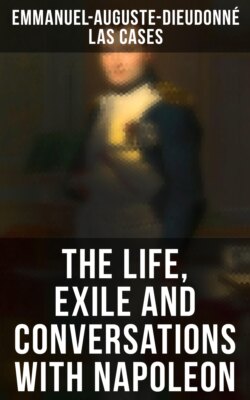Читать книгу The Life, Exile and Conversations with Napoleon - Emmanuel-Auguste-Dieudonné Las Cases - Страница 86
На сайте Литреса книга снята с продажи.
THE EMPEROR AIMED AT BY A SOLDIER.—OUR EVENING
AMUSEMENTS.—NOVELS.—POLITICAL REMARKS.
ОглавлениеTable of Contents
12th—14th. The Emperor had now for several days left off his excursions on horseback. The result of his attempt to resume them, on the 12th, was neither calculated to revive his partiality for this amusement, nor to render it once more habitual to him. We had cleared our valley as usual, and were re-ascending at the back part opposite Longwood, when a soldier from one of the heights, where there had hitherto been no post, called out several times, and made various signs to us. As we were in the very centre of our circuit, we paid no attention to him. He then came running down towards us, out of breath, charging his piece as he ran. General Gourgaud remained behind, to see what he wanted, while we continued our route. I could see the General, after dodging the fellow many times, collar and secure him: he made him follow him as far as the neighbouring post by the Grand Marshal’s, which the General endeavoured to make him enter, but he escaped from him. He found that he was a drunken corporal, who had not rightly understood his watchword. He had frequently levelled his piece at us. This circumstance, which might have been very easily repeated, made us tremble for the Emperor’s life: the latter looked upon it only as an affront, and a fresh obstacle to the continuance of his exercises on horseback.
Napoleon had ceased giving invitations to dinner: the hours, the distance, the dressing, were inconvenient to the guests: to us these parties produced only trouble and constraint, without any pleasure.
The Emperor had by degrees resumed his regular work. He now dictated daily to the Grand Marshal upon the expedition to Egypt; some time before dinner he ordered me and my son to be called to him, in order to read the different chapters of the Campaigns of Italy over again, and separate them into paragraphs. Reversis had gone out of fashion; the Emperor had given it up. The time after dinner was henceforth devoted to the reading of some work: the Emperor himself read aloud; when he was tired, he handed the book over to some other person; but then he never could bear their reading more than a quarter of an hour. We were now reading novels, and we began many which we never finished, Manon l’ Escaut we soon rejected as fit only for the ante-chamber; then followed the Memoirs of Grammont, which are so full of wit, but so far from honourable to the morals of the great of that period; the Chevalier de Faublas, which is only to be endured at the age of twenty years, &c. Whenever these readings could be protracted to eleven or twelve o’clock, the Emperor seemed truly rejoiced. He called this making conquests over time; and he found such victories not the most easy to gain.
Politics had also their turn. Every three or four weeks, or thereabouts, we received a large packet of journals from Europe; this, like the cut of a whip, set us going again for some days, during which we discussed, analyzed, and re-discussed the news: and afterwards fell again insensibly into our usual melancholy. The last journals had reached us by the Greyhound sloop, which had arrived some days before. They occupied one of the evenings, and gave rise to one of those moments, wherein that ardour and inspiration burst forth from the Emperor, which I have sometimes witnessed in the Council of State, and which escape him from time to time even here.
He took large strides as he walked amongst us, becoming gradually more animated, and only interrupting his discourse by a few moments of meditation.
“Poor France,” said he, “what will be thy lot! Above all, what is become of thy glory!... I suppress the rest, which is of very great length: I must suppress it.”
The papers seeming to say that England desired the dismemberment of France, but that Russia had opposed it, the Emperor said that he expected this; that it was natural that Russia should be dissatisfied at seeing France divided; because she would then have to fear that the different states of Germany would unite against her; whilst, on the other hand, the English aristocracy must be desirous of reducing France to the extremity of weakness, and of establishing despotism upon her ruins. “I know,” said he, “that this is not your opinion,” addressing himself to me; “you are an Englishman.” I replied that it was very difficult to dispute with him; but that it appeared to me that in this same English aristocracy, it must be allowed, there might possibly exist heads sufficiently clear, as well as hearts just enough, to understand that, after having overthrown that which threatened their existence, it might prove advantageous to raise up that which was no longer to be dreaded; that circumstances were now singularly favourable for establishing a new system, which might for ever unite the two nations in their dearest interests, and render them necessary to each other, instead of keeping them in perpetual enmity, &c. The Emperor concluded the conversation by saying that he must be very perverse, without doubt; but that, with every consideration that he could give the subject, he could foresee nothing but catastrophes, massacres, and bloodshed.
